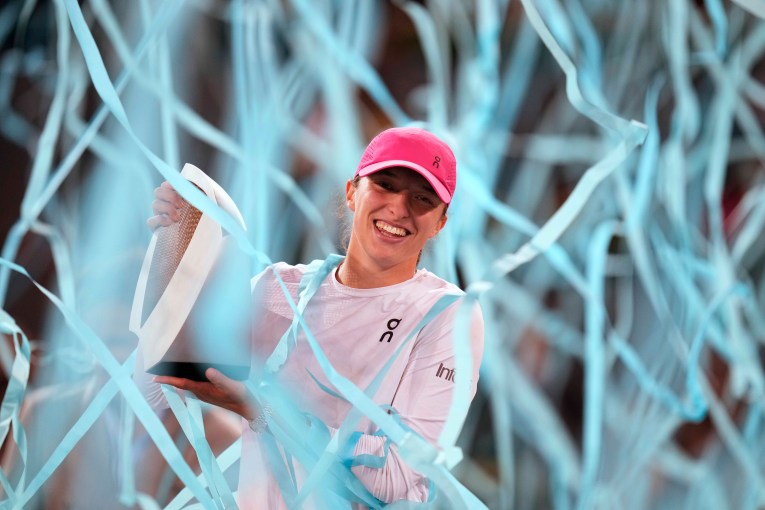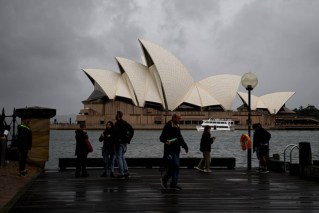Undecided voters award Anthony Albanese victory in final leaders’ showdown

Undecided voters in marginal seats have named Anthony Albanese the clear winner of the third and final leaders’ debate which was a more sedate affair than the previous ‘shouty’ match.
The Final Showdown on the Seven Network on Wednesday night included a ‘pub test’ of 160 voters who scored Mr Albanese 50 per cent and Mr Morrison 34 per cent while 16 per cent remained undecided.
Meanwhile a YouGov poll of 19,000 voters commissioned by The Australian shows the Coalition heading for defeat, with Labor winning 80 seats and the Coalition reduced to 63. Seven seats would go to independents and one to the Greens.
The late-night debate touched off on key election issues of wages, the rising cost of living, climate change, child care and an anti-corruption commission, and the opponents even outlined something they admired about the other.
While there were no policy announcements, Mr Morrison confirmed Education Minister Alan Tudge would return to the role if the Coalition is re-elected.
Mr Tudge stood aside in December after being accused of emotional and physical abuse by staffer Rachelle Miller, with whom he was having a consensual affair.
Mr Tudge strenuously denies the allegations, and an investigation found there was insufficient evidence he had breached ministerial standards.
Ms Miller will receive a $500,000 taxpayer-funded settlement, which was raised during the debate and led to discussion of the need for an independent federal anti-corruption commission.
Mr Morrison said he welcomed Mr Tudge returning to the ministry and noted that the payout to Ms Miller “has not even been settled”.
“That’s because these are matters to go to very private interactions between people and they are handled sensitively.”
Mr Albanese reaffirmed his election promise to establish a national anti-corruption watchdog this year to “clean up politics” and reiterated that it needed to be independent.
“Under the model put forward by Mr Morrison, ministers would decide … whether something was referred to an anti-corruption commission,” he said.
In response, Mr Morrison blamed Labor for not supporting the government’s version – even though the bill had not been introduced –and said it needed to be “designed right”.
Wage rise only ‘two cups of coffee’

Anthony Albanese reaffirmed the need for a 5.1 per cent minimum wage rise. Photo: AAP
With nine days before the May 21 election, the two leaders also traded barbs on wages growth and cost of living pressures.
Mr Albanese said low-wage workers, including cleaners and aged care employees were “heroes of the pandemic” and deserved “more than our thanks”.
“I want a better future where we deal with the cost of living crisis where everything is going up except for people’s wages,” he said.
The Opposition Leader said a 5.1 per cent minimum wage increase amounted to “two cups of coffee a day”.
Mr Morrison said he also backed a wage rise for all workers, but small businesses across the country would struggle to pay that increase “on top of all the other things they’re facing”.
“People won’t be worrying about what their wages are, they will be worrying about whether they have a job,” the Prime Minister said.
Mr Albanese highighted Labor’s childcare policy, costed at $5.4 billion, noting that was less than the government had wasted on the torn-up French submarine contract.
“This is the most wasteful government in Australia’s history. Waste and rorts is something that has characterised this government because it treats taxpayers’ money like its Liberal Party money,” he said.

Scott Morrison claimed his opponent was ‘loose’ on the economy. Photo: AAP
Both leaders were asked about the shift towards independents and micro parties among voters, and what they thought was driving it.
Mr Albanese said there was a great deal of disillusionment with major parties, with people fed up with revolving doors of leadership and corrupt practices seen in recent times, highlighting the need for a national anti-corruption commission.
Mr Morrison said the past three years had been “incredibly tough”, and that had affected people’s views of politics. But a vote for independents would be a vote to weaken parliament and weaken Australia.
Mr Morrison was asked to justify his criticism of his opponent when he labelled him the “most dangerous leader since Gough Whitlam”.
He said Mr Albanese “has been very loose” on economic policy and “makes things up as he goes along”.
In response, Mr Albanese slammed Mr Morrison for his handling of the pandemic and natural disasters.
When asked what trait they admired in each other, Mr Morrison said it was Mr Albanese’s rise from “humble beginnings” to become the Labor leader.
Mr Albanese said Mr Morrison was committed to the nation and had invested in mental health.

The third leaders debate was televised after Big Brother. Photo: Channel 7
Mr Albanese’s performance was deemed superior in six of the seven seats surveyed as part of the ‘pub test’.
Voters in the Western Australian seat of Hasluck were the exception. They judged the debate a draw, with each of the leaders attracting 44 per cent of the vote, and 12 per cent remaining undecided.
Those in the NSW seat of Macquarie – the most marginal seat in the nation – awarded the Labor leader 50 per cent of the vote, with only 25 per cent plumping for the PM. A quarter were undecided.
The result was replicated in the Northern Territory seat of Solomon.
Mr Albanese scored decisive wins in the Tasmanian seat of Bass and South Australian seat of Boothby, with a 52-32 margin (16 per cent undecided).
The Victorian seat of Chisholm, which is held by Liberal Gladys Liu on a 0.5 per cent margin, opted for Mr Albanese (52 per cent) over Mr Morrison (35 per cent), with 13 per cent still to decide.
The Queensland seat of Lilley was closer, with a 54-41 result and only 5 per cent undecided.
-with AAP








